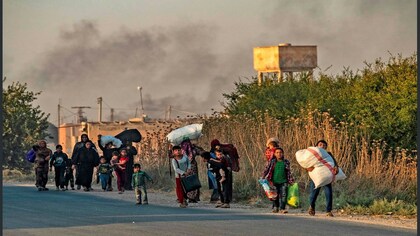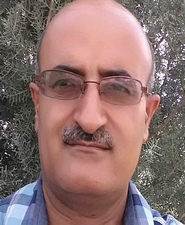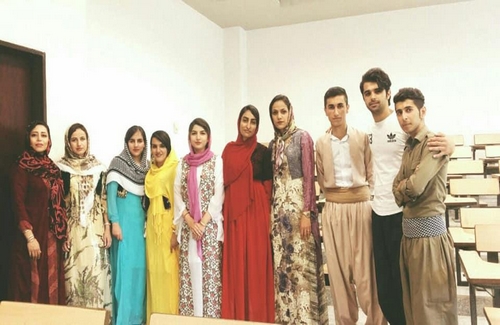Echoes from the Other Land, a stirring account of author's life and the persecution facing Kurdish people
12:38 - 2 May 2012

By Darren Lum
Tears welled up and silence prevailed among the audience members while a Kurdish author described the cultural genocide of her people.
Ava Homa, author of critically acclaimed book Echoes from the Other Land, gave a stirring account of her life and the persecution facing Kurdish people during the Friends of the library annual general meeting held at the Minden branch on Friday, April 27.
It’s a good day when you don’t hear the names of loved ones as a list of the dead is announced on the radio, she said. In her lifetime, all of her uncles and many neighbours have been arrested and tortured for simply being Kurdish.
Contrary to public perception, torture is not meant to kill so much as break you, she adds.
Tension permeated the air when she described how her life changed forever at six months old.
That was when her father, who was reported by neighbours to the authorities, was arrested for having two banned books.
When he did return he was never the same, holding fast to “invisible injuries.”
He was full of hate for the injustice paid against him.
Her talk was accompanied by evocative images of pain and beauty, whether it was illustrating government-sanctioned firing squad killings, the majestic Kurdistan landscape or the resilient Kurdish people.
With educated parents, she pursued her studies, even teaching English in Iran at 17.
Despite a prevailing attitude in society to have women focus more on housework and to be married off by puberty than education, Homa persevered with her studies of English and literature in Iran.
Although life for Kurds in Kurdistan, which is bordered by Iran, Syria, Turkey, Armenia and Iraq, has its benefits of being in their ancestral country, there are random arrests and government-sanctioned firing line killings for suspected terrorists, Homa said.
She points out Kurds are regularly being suspected for terrorism since the fight for independence from the Iraq government continues.
The Iraqi government authorizes the Kurdistan Regional Government to govern Iraqi Kurdistan. However full autonomy is desired.
There is a constant struggle for independence by the Kurds in disputed regions. Rebellion suppression has resulted in horrific results such as the 1988 chemical gas attack by a Saddam Hussein’s Iraq government on a general population of people, which left 5,000 people dead in five minutes.
Over the decades many countries have used Kurdistan for its natural resources such as oil, she said. This has left the Kurds alone in the world, unable to gain the attention of the world’s media.
Homa, married, has spent the past five years in Canada, exiled.
She knows if she returns she will be arrested and hopes to one day be reunited with her brother, who she has not seen since she left Iran.
Now she is a George Brown College teacher, translator (Farsi/English) and a writer-in-residence for the Minden Hills Cultural Centre.
The strikingly beautiful author, who arrests people equally with her exotic beauty and her unflinching accounts of the struggles of her people, escaped Iran with a student visa to take advantage of an academic scholarship to Windsor University, completing a Masters in English and creative writing.
Her book, Echoes from the Other Land, was nominated for the 2011 Frank O’Connor International Short Story Award and earned a sixth in the top 10 of winners for the CBC Reader’s Choice Contest for the Giller Prize.
The book is a collection of short stories that focus on the woman’s perspective in Iran.
For more information on Homa see her website (www.avahoma.com).
Source: The Minden Times
Tears welled up and silence prevailed among the audience members while a Kurdish author described the cultural genocide of her people.
Ava Homa, author of critically acclaimed book Echoes from the Other Land, gave a stirring account of her life and the persecution facing Kurdish people during the Friends of the library annual general meeting held at the Minden branch on Friday, April 27.
It’s a good day when you don’t hear the names of loved ones as a list of the dead is announced on the radio, she said. In her lifetime, all of her uncles and many neighbours have been arrested and tortured for simply being Kurdish.
Contrary to public perception, torture is not meant to kill so much as break you, she adds.
Tension permeated the air when she described how her life changed forever at six months old.
That was when her father, who was reported by neighbours to the authorities, was arrested for having two banned books.
When he did return he was never the same, holding fast to “invisible injuries.”
He was full of hate for the injustice paid against him.
Her talk was accompanied by evocative images of pain and beauty, whether it was illustrating government-sanctioned firing squad killings, the majestic Kurdistan landscape or the resilient Kurdish people.
With educated parents, she pursued her studies, even teaching English in Iran at 17.
Despite a prevailing attitude in society to have women focus more on housework and to be married off by puberty than education, Homa persevered with her studies of English and literature in Iran.
Although life for Kurds in Kurdistan, which is bordered by Iran, Syria, Turkey, Armenia and Iraq, has its benefits of being in their ancestral country, there are random arrests and government-sanctioned firing line killings for suspected terrorists, Homa said.
She points out Kurds are regularly being suspected for terrorism since the fight for independence from the Iraq government continues.
The Iraqi government authorizes the Kurdistan Regional Government to govern Iraqi Kurdistan. However full autonomy is desired.
There is a constant struggle for independence by the Kurds in disputed regions. Rebellion suppression has resulted in horrific results such as the 1988 chemical gas attack by a Saddam Hussein’s Iraq government on a general population of people, which left 5,000 people dead in five minutes.
Over the decades many countries have used Kurdistan for its natural resources such as oil, she said. This has left the Kurds alone in the world, unable to gain the attention of the world’s media.
Homa, married, has spent the past five years in Canada, exiled.
She knows if she returns she will be arrested and hopes to one day be reunited with her brother, who she has not seen since she left Iran.
Now she is a George Brown College teacher, translator (Farsi/English) and a writer-in-residence for the Minden Hills Cultural Centre.
The strikingly beautiful author, who arrests people equally with her exotic beauty and her unflinching accounts of the struggles of her people, escaped Iran with a student visa to take advantage of an academic scholarship to Windsor University, completing a Masters in English and creative writing.
Her book, Echoes from the Other Land, was nominated for the 2011 Frank O’Connor International Short Story Award and earned a sixth in the top 10 of winners for the CBC Reader’s Choice Contest for the Giller Prize.
The book is a collection of short stories that focus on the woman’s perspective in Iran.
For more information on Homa see her website (www.avahoma.com).
Source: The Minden Times



